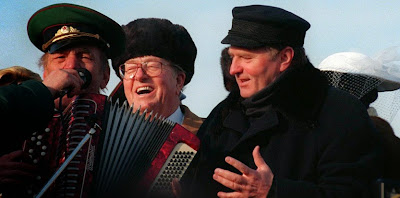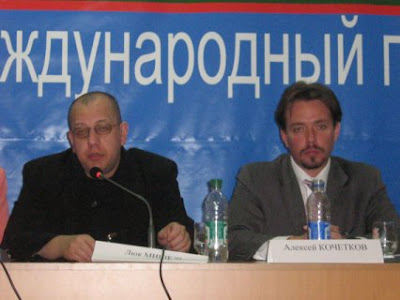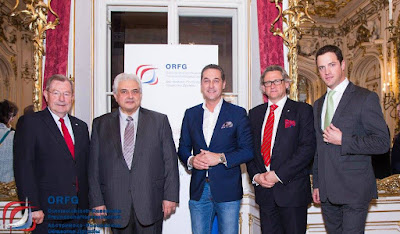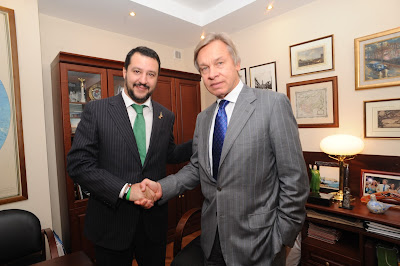Tactical collaboration with the European, especially German, extreme right characterised even the Cold War period of Russian history despite the horrors of the Second World War and the Soviet Union’s official condemnation of fascism.
One example of Soviet collaboration with the German extreme right is the Soviet financial support for the extreme right neutralist movement in West Germany in the beginning of the 1950s. That period was marked by the beginning of the Cold War, and, in its struggle against the West, the Soviets employed a broad range of what they called “active measures” – actions comprising of establishing espionage rings in Western societies, spreading disinformation among Western publics, buying political influence, supporting socialist and communist parties, infiltrating Western peace movements, etc.
The beginning of the 1950s was also a period in which West German political elites discussed a prospect of their country joining NATO. The Soviets opposed such a development and supported not only left-wing organisations in West Germany, but also extreme right neutralist movements that also opposed NATO membership.
While the Soviet collaboration with the European far right had a covert nature and was invisible for a regular observer, the cooperation between various Russian actors and European far right parties in the post-Soviet era has had a largely open character. This cooperation is best analysed through examining its three particular phases distinguished on the basis of different positions of Russian representatives involved in this cooperation.
In this period, Russian ultranationalists such as Alexander Dugin, Vladimir Zhirinovsky, Sergey Glazyev and some others established contacts with far right politicians in France, Italy, Spain, Germany, Belgium, the US and other Western countries. At that time, Dugin was a fringe politician yet an influential ideologue of Neo-Eurasianism and National Bolshevism who was engaged in cultural, rather than political, struggle against liberal democracy. Zhirinovsky was the leader of the misleadingly name far right Liberal-Democratic Party of Russia – a party that emerged as the strongest political force after the 1993 parliamentary elections and as the second strongest – after the 1995 parliamentary elections. Glazyev was, for a short period of time, Minister of Russia’s External Economic Relations, then an MP and, later, head of the analytical department of the Federation Council of Russia.

For Dugin, Zhirinovsky and Glazyev, the immediate enemy was inside Russia, so at that time they could only use their Western far right contacts to strengthen their own positions inside the country, rather than instrumentalise their Western counterparts against the perceived external adversaries of the Russian state. The most important characteristic of this phase of the cooperation between Russian actors and the European far right was that official Moscow was not interested in any contacts with the European far right – the Kremlin actively developed relations with mainstream Western politicians and officials who, perhaps erroneously, believed that Russia would become part of the liberal-democratic West.
The start of this period is rooted in the Kremlin’s reaction to the series of “colour revolutions” in Georgia (2003), Ukraine (2004) and Kyrgyzstan (2005).
These “revolutions”, which were in fact mass street protests against fraudulent elections, were interpreted by official Moscow as attempts by the West in general and the US in particular to undermine Russian political and economic influence in the post-Soviet space. The Kremlin increasingly turned to anti-Western and anti-American narratives in its rhetoric, and launched various initiatives to thwart the largely imaginary threat of a “colour revolution” in Russia. Furthermore, given the role that the results of independent electoral observation played in mobilising protesters against stolen elections, Moscow started to look for alternative instruments of international election observation missions that would be either genuinely pro-Kremlin or controlled by the political circles close to the Kremlin.
The Russian, formally independent electoral monitoring organisation CIS-EMO headed by former Russian fascist activist Aleksey Kochetkov provided such an alternative. CIS-EMO started cooperating with two EU-based organisations, the Belgian Eurasian Observatory for Democracy and Elections and the Polish European Centre for Geopolitical Analysis – both were led by far right activists, Luc Michel and Mateusz Piskorski respectively. The three organisations invited far right and far left politicians and activists for international election observation missions, and, since 2005-2006, have been engaged in legitimising practices of electoral authoritarianism in the post-Soviet space while always remaining loyal to the objectives of Russia’s foreign policy centred around maintaining Russia’s perceived sphere of influence.

This development started after the Russian-Georgian war in August 2008. The Kremlin understood that it could win the war easily, but could not convince Western societies in the allegedly justified nature of the aggression against Georgia. As Moscow was facing criticism from the West, the Russian state-controlled media outlets changed the tactics: previously, they relied on promoting the argument that Moscow’s international and domestic activities were driven by good intentions, but since 2008-2009 the Russian media also started pushing the message that the West could not appreciate Russia’s actions because Western liberal-democratic societies were decadent, plagued by same-sex marriages, moral crisis, failing multiculturalism and disrespect for the rights of the majority. To promote this message, the Russian media have engaged with activists and politicians coming from the fringes of the socio-political life in the West, namely the far right, far left, conspiracy theorists and isolationists.
In Italy, the first pro-Russian efforts were launched by the Eurasia Coordination Project led by Stefano Vernole and Alberto Ascari, as well as the Institute of Advanced Studies in Geopolitics and Auxiliary Sciences headed by Tiberio Graziani and Daniele Scalea. In Austria, the initial pro-Russian activities were carried out through the company Austrian Technologies GmbH closely linked to the Freedom Party of Austria and headed by Barbara Kappel. In France, these were the France-Russia Collective led by André Chanclu and the Association France-Europe-Russia Alliance led by Fabrice Sorlin.

While the Russian element of the first phase of cooperation with European far-right activists and politicians was represented only by Russian ultranationalists, the second phase was marked by the increasing involvement of Russian stakeholders of a higher status. These included representatives of Russian institutions aiming to influence public opinion outside Russia and cooperating with Russian-speaking diasporas: Rossotrudnichestvo, Russian World Foundation, and the Paris-based Institute of Democracy and Cooperation. Moreover, representatives of Russian embassies and consulates in particular European countries started helping build contacts between the far right organisations and Russian officials.
Their engagement was a result of two major, sometimes overlapping developments. The first one was the ongoing process of the anti-Western and anti-American radicalisation of Putin’s regime that had started to develop already in 2004-2005 but was deepened by Moscow’s negative reaction to the “Arab Spring”, i.e. the wave of protests, riots and regime changes in the Arab world in 2010-2012, as well as the anti-Putin protests in 2012-2013. The second was the growing criticism of domestic and foreign policies of Putin’s Russia coming from Western mainstream politicians and state officials. This criticism related, in particular, to (1) the failure of the Russian authorities to investigate the death of imprisoned corporate lawyer Sergei Magnitsky in a Moscow prison in 2009 – the US and EU imposed sanctions related to Magnitsky in 2012; (2) the Kremlin’s crackdown on the anti-Putin protests and the polarising measures employed by the Kremlin to divide the opposition (most importantly, the Pussy Riot show trial and the “anti-LGBT propaganda law”); (3) Putin’s support for Syrian President Bashar al-Assad whose suppression of the anti-government protests resulted in the outbreak of the Syrian civil war in 2011; and (4) Russian annexation of Crimea and invasion of Eastern Ukraine in 2014.
As a result, high-ranking members of the ruling United Russia party, Russian diplomats and state officials such as Chairman of the Russian Parliament Sergey Naryshkin or the head of the Russian Parliament foreign affairs committee Aleksey Pushkov, as well as President Vladimir Putin himself, increasingly developed contacts with the European far right, especially the French National Front, Italian Northern League and Bulgarian Attack party.

In April 2014, Putin declared that electoral victory of Viktor Orbán’s “illiberal-democratic” Fidesz and electoral successes of the far right parties such as Hungarian Jobbik and French National Front pointed to the “rethinking of values in European countries” along the lines promoted by Moscow (i.e. “conservative values”), thus providing Moscow’s ideologically-driven opening to the European far right.
Moreover, the low-interest multi-million loan granted, in 2014, to the National Front by a Russian bank owned by Putin’s close associate implied that, at least in some cases, Moscow was ready to financially support the far right struggling to subvert the liberal-democratic West, undermine the EU and weaken the transatlantic cooperation thus contributing to Moscow’s geopolitical objective that consists in the conclusion of a “new Yalta agreement” that would fix a Russian sphere of influence and legitimise the indefinite rule of the authoritarian kleptocratic regime in Russia.
Related:
- How Alexander Dugin’s neo-Eurasianists geared up for the Russo-Ukrainian war in 2005-2013
- Russian politicians building an international extreme right alliance
- Aleksandr Dugin and the SYRIZA connection
- New York’s anti-Ukrainian art gallery, and the far-right Russian network behind it
- The “Ukraine crisis” is a long-planned operation
- French Eurasianists join (pro-)Russian extremists in Eastern Ukraine
- Pro-Russian activism of Mateusz Piskorski, detained in Poland




